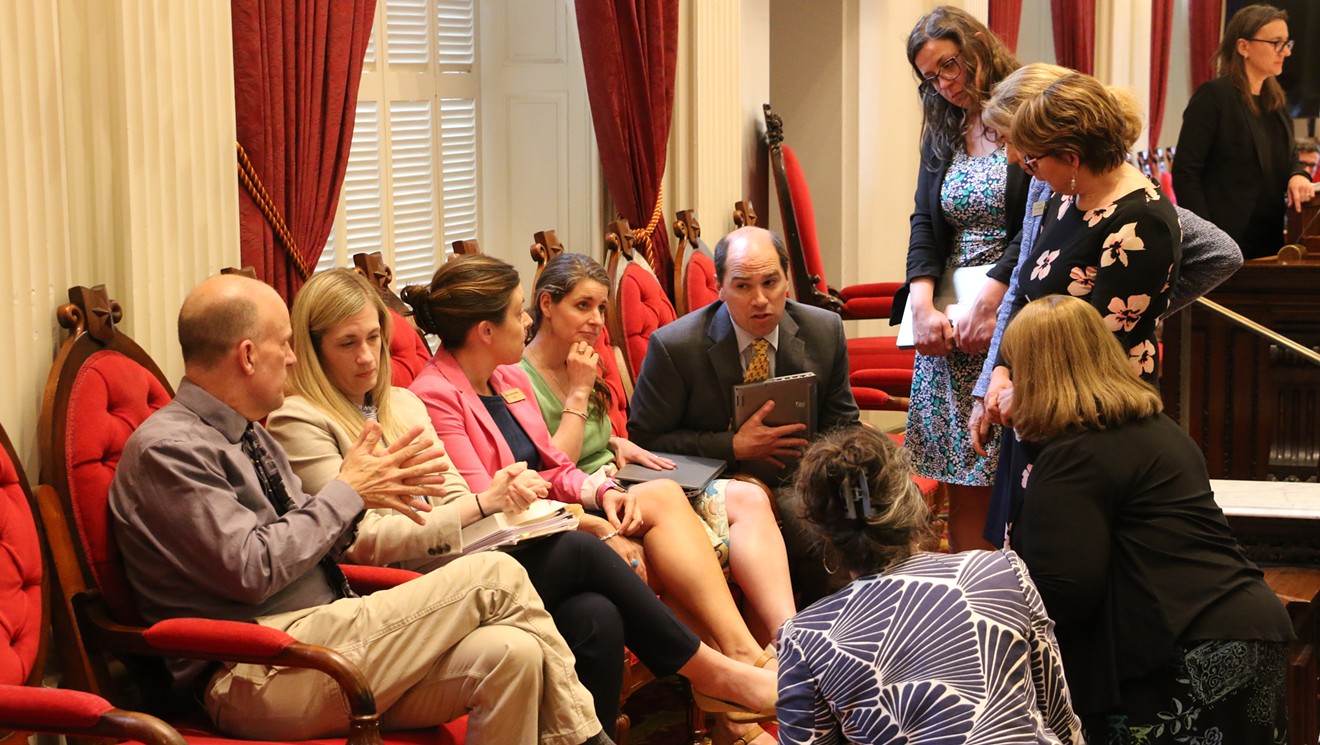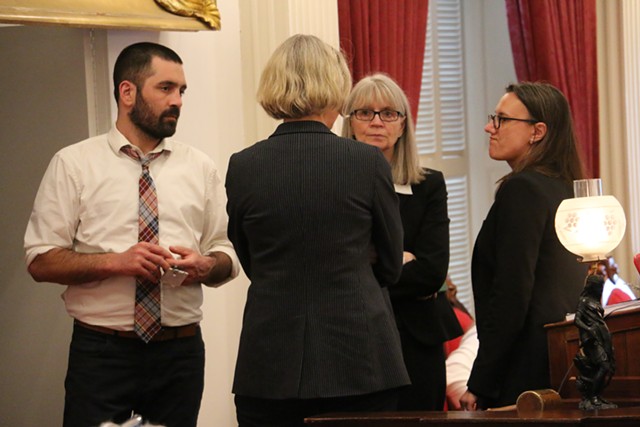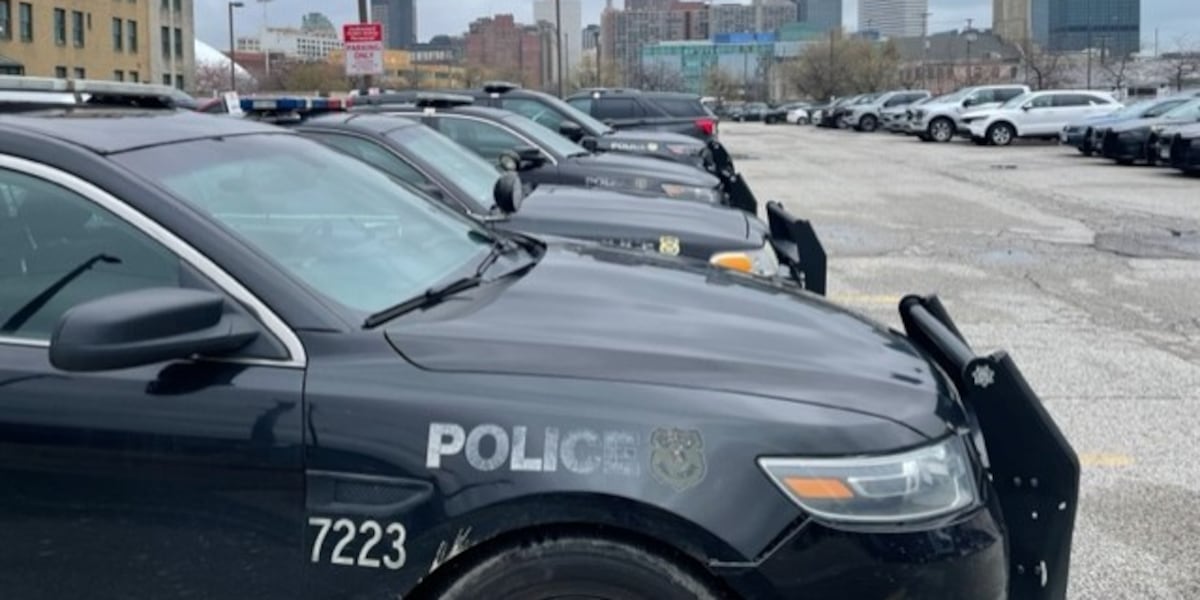Vermont
After a Wrenching Debate Over Homelessness, Vermont Legislature Adjourns

Following Thursday’s breakthrough on how to fund a $130 million boost to the state’s childcare system, lawmakers rushed to pass several outstanding bills, including the $8.5 billion state budget.
They passed it knowing full well that Scott will likely veto the budget and other bills in coming days, forcing them to return to attempt to muster the two-thirds majority needed to override.
With Democratic supermajorities in both chambers, that would seem simple. Just this week, the legislature overrode Scott’s veto of the controversial clean heat standard bill meant to accelerate the shift away from fossil fuel heating sources.
But the budget passed the House by a 90-53 vote late Friday, well short of the 100 needed to override — a sign of potential trouble for Democratic leadership. Several Democratic and Progressive lawmakers said they could not support the budget unless more is done to help homeless people facing eviction from motels, suggesting the budget fight is far from over.
Cina said the budget will not prevent a looming crisis when 1,800 households are evicted from motels as the pandemic-era housing program winds down. The number of people being kicked out of the motels in coming weeks was equal to 70 encampments the size of the one that the city of Burlington dismantled on Sears Lane in 2021, Cina said.
“The mass eviction from hotels is going to create a new public health emergency,” he said.
The worst part is the administration knew the emergency program was ending and had plenty of time to plan to transition people to long-term housing but didn’t, Rep. Mari Cordes (D-Lincoln) said.
“It is not a money problem, but a problem of political will and a disaster in the making,” Cordes said.
Rep. Troy Hedrick (P/D-Burlington) called the budget “a profound disappointment” that was contributing to his disillusionment with the legislative process. He said was stunned to realize that instead of addressing people’s desperate housing needs, the budget “parked” $14 million until 2025 on the premise that it would be needed to match future federal infrastructure dollars.
He said the motel program has been a “very small Band-Aid” on the wound of homelessness in Vermont.
“This budget is simply ripping off that Band-Aid while that wound is still trying to heal,” Hedrick said.
Many lawmakers who expressed disappointment over the motel program nevertheless said they would support the budget because of the spending on housing and number of other initiatives that it does include.
“This budget, while not perfect … still makes over $200 million of investments in helping the most vulnerable Vermonters,” said Rep. Tom Stevens (D-Waterbury) .
The uproar over the ending of the motel program was due in no small part to the relentless lobbying of Brenda Siegel, a homeless advocate and the 2022 Democratic candidate for governor. She posted numerous videos of homeless people in the motel program afraid of what will happen to them if they lose their motel vouchers.
She predicted that by the time lawmakers return in June, hundreds of homeless people will have been forced out of their shelter and into the streets, and then it will hit home for lawmakers.
“It’s going to be pretty brutal to watch,” she predicted.
Despite the differences over that program, Democratic lawmakers nevertheless clearly flexed their newfound power in Montpelier this session, where, for the first time, they enjoy theoretically veto-proof majorities in both chambers. That emboldened them to push forward bills on climate change, child care and guns that in past years might have enjoyed little chance of success.
House Speaker Jill Krowinski (D-Burlington) thanked lawmakers for their hard work and urged them to take pride in the progress they made this session. “Together we have governed with purpose and built a stronger foundation for Vermont, one that moves all 14 Vermont counties forward,” she said shortly before adjourning around 11:30 p.m.
The high-profile bills passed this session include:
Under tremendous pressure to fix the state’s housing crisis, lawmakers tried to both make big new investments in affordable housing and relax development restrictions in downtowns.
The result was the sprawling S. 100, known as the “Home” bill, which spends $116 million on a wide variety of housing programs. It dedicates $50 million to mixed-income affordable housing, $20 million in grants to fix up rental properties, $20 million to speed the construction of homes of middle-income people, $2 million for first-time home buyers and $500,000 to update mobile home parks.
The changes to municipal zoning and Act 250 in the bill often received more debate than the financing, however. The bill would loosen restrictive zoning that some say blocks the construction of affordable housing. One change is to require communities to allow duplexes wherever single-family homes are allowed.
Related changes to Act 250, the state’s land use and development law, include raising the cap on the number of homes a person can build within five miles within five years without facing review under the law. Instead of 10, the new limit would be 25 units in downtowns and areas designated for growth.
Childcare Funding
Most lawmakers agreed the state’s childcare system faces an affordability and staffing crisis and needs a massive infusion of cash to stabilize it. But they disagreed sharply on how to pay for it.
House leaders wanted a combination of higher corporate and personal income taxes to fund much of the $130 million infusion, while senators thought payroll taxes made more sense because employers and workers would benefit most from the system’s expansion and improvement.
A deal struck Thursday and approved Friday afternoon by the House on the bill, H.217, was hailed as a compromise that would lead to a historic investment. Scott, who had proposed a $50 million investment with no tax increase, has vowed to veto the bill.
Clean Heat
Weaning a northern state like Vermont off fossil fuel heating sources is widely viewed as a huge challenge, but lawmakers committed to figuring it out this year. They passed S.5, the clean heat standard, and then overrode Scott’s veto, something they failed to do last year by just one vote. Lawmakers hailed the vote as a crucial step toward cleaning up emissions from burning oil, propane, kerosene and natural gas.
“This is probably one of the most important things I’ve done here and as a parent,” Rep. Laura Sibilia (I-Dover) said after the vote.
The bill requires energy regulators to start crafting a program mandating the state’s fossil fuel dealers to lower the greenhouse gas emissions from their products, either by reducing demand through insulation projects or switching customers to lower-carbon fuels.
Republicans blasted the bill as likely to hurt low income Vermonters who can’t afford to switch, but supporters said reducing the cost of heating for low-income people is the program’s priority.
Bottle Bill
Wine bottles and plastic water bottles will soon be returnable for a deposit under a long-sought expansion of the state’s beverage redemption program. Currently, only certain glass and aluminum beverage containers can be returned for a five-cent deposit.
The bill, H.158, will add a 15-cent deposit on wine bottles and a five-cent deposit on hard cider, water and sports drink containers. Advocates originally wanted to increase the deposit for most bottles from five cents to 10 cents, but that will only happen later if the state misses its recycling goals.
Retailers worry they won’t have the room to handle all the additional containers. Gov. Scott has said he prefers improving the blue-bin recycling system, but it’s not clear whether this bill will be on his veto list.
Lawmaker Pay and Perks
To make it easier for working class Vermonters to serve in the General Assembly, lawmakers will boost members’ pay beginning in 2025 and grant themselves access to the same health benefits state workers receive.
The bill, S.39, will boost salaries during the 18-week session and pay lawmakers one-fifth of that salary when they’re out of session. Rank-and-file lawmakers currently receive $14,616 plus allowances for food and lodging. By 2027, their salary would more than double, to at least $29,766 annually, and they could get health insurance coverage.

Vermont
Vermont Conversation: Million meter man Noah Dines on his record-setting year of living strenuously – VTDigger

The Vermont Conversation with David Goodman is a VTDigger podcast that features in-depth interviews on local and national issues with politicians, activists, artists, changemakers and citizens who are making a difference. Listen below, and subscribe on Apple Podcasts, Google Podcasts or Spotify to hear more.
For Noah Dines, life has been an uphill climb. And that is his dream come true.

Dines, a 30 year-old Stowe local, is in the process of setting a new world record for human powered vertical feet skied in one year. The previous record had been 2.5 million feet set in 2016 by Aaron Rice, another Stowe skier. Dines broke Rice’s record in September, then surpassed his original goal of skiing 3 million feet in October, broke 1 million meters — or 3.3 million feet — in early December, and will wrap up the year having skied 3.5 million feet.
Uphill skiing is known as skinning, so named for the strips of material that attach to the bottom of skis that enable skiers to glide uphill without slipping backwards. They used to be made from seal skins, hence the name skinning. Skinning up ski area trails has become a popular form of exercise in recent years, and backcountry skiers also use skins to travel where there are no lifts.

Dines began his uphill skiing quest on New Years Day 2024 just after midnight. He turned on his headlamp, snapped on his lightweight alpine touring skis and quietly skied off into the night up the trails of Stowe Mountain Resort. He has spent this year chasing snow around the world, from Vermont, to Oregon, Colorado, Europe and Chile. He has skied all but about 30 days this year. A typical day has him skiing uphill about 10,000 feet. At Stowe, that means he skis at least five round trip laps per day, often more. He will finish his quest at the end of this month and will be joined in his last days by his father, who has never skied uphill before.
I met up with Noah Dines on December 17 at the base lodge at Spruce Peak at SMR. It was raining, but Dines was still skiing.
“If you bail when it rains all the time, then you’re not getting everything you could,” he said.
Dines explained that his record quest has required “a lot of saying no” to everything from friends’ weddings to having a beer, from which he has abstained. “Your response to anything has to do with, how will this affect my big year?” he said.
READ MORE

Conceding that “the money has definitely been hard,” Dines has supported himself during his year of chasing snow through sponsorships from Fischer Skis, Maloja clothing and Plink electrolyte drinks. He also raised $10,000 through a GoFundMe and has drawn down his savings.
What has a year of living strenuously meant?
“Friendships. I’ve met so many incredible people. It’s meant learning how to persevere and work harder than I’ve ever worked before. It’s meant seeing beautiful sunsets in Chile. It’s meant cold mornings and crisp Alpine air. In Europe, it’s meant croissants on the side of a mountain. It’s meant more time with friends in Stowe.”
By pursuing a dream, Dines hopes that he can be a model for others. “I have a passion and I pursued it and I’ve pushed myself as hard as I can, and you can too,” he said. “It doesn’t have to be with sports or take a year, but there’s no reason that you can’t set goals and meet them, that you can’t push yourself just because you didn’t grow up doing it.”
What will the million meter man do to start 2025?
“Well first and foremost, I’ll take a little nap, at least for an afternoon.”
Vermont
Opinion — Rep. Mike Mrowicki: The spirit of cooperation for the 2025 legislative session

This commentary is by Mike Mrowicki, democratic state representative for the Windham-4 district.
As we head into the 2025 legislative session in January, I want to first offer congratulations to Gov. Scott, Jason Maalucci and the Republican campaign effort. They sure got it right about affordability.
Yes, property taxes / education funding are on people’s minds but the ongoing frustration about inflation/affordability also includes the price of eggs, the increase in health insurance cost and rising home insurance costs. Especially where there’s been flooding two years in a row.
So, Vermonters want action and there sure seems a broad sense of enthusiasm from legislators to come together and get the work done. To balance the competing needs of providing our kids a quality education and making it affordable. After all, the kids of today will be taking our blood pressure tomorrow and don’t we want them to be able to do it accurately, based on the quality education they got in Vermont?
At the same time, no one should feel that their taxes are a threat to staying in their homes. We need to make sure, especially for those on fixed incomes, that despite rising property values, property taxes should reflect ability to pay.
In the spirit of working together with the governor, then, I and other legislators are eagerly awaiting his ideas for fixing the property tax / ed funding dilemma. And, we are ready to hear what he has to say on the raft of other factors that challenge Vermonters’ sense of affordability.
Like the cost of health insurance. Blue Cross Blue Shield Vermont individual premiums will rise by 19.8% next year. There isn’t a budget this doesn’t affect: home budgets, town budgets, school budgets and state budgets. It’s a cost driver across the board and we’re looking forward to hearing the governor’s plan on how to make this more affordable.
Housing is unaffordable and, in many cases, unavailable, especially for our financially challenged neighbors. The lack of housing is the barrier to progress in so many sections of our landscape. It is the greatest barrier to growing our workforce and economy so, likewise, we’re looking forward to the governor’s plans on Housing.
The cost of transportation and maintaining our roads and bridges is also unaffordable. This is compounded by our gas taxes no longer providing sufficient funds to maintain our roads and bridges. Here’s another area where we’re waiting to hear the administration’s plan so we can work together to solve this.
And, of course, climate change is costing towns across Vermont unaffordable amounts to fix the damage from this year’s floods, and last year’s as well. Who knows what next year will bring, but these are costs that Vermont taxpayers are bearing right now and adding to the pile of issues that are making Vermont unaffordable. We’ll be looking forward to hearing from the governor and his administration how we make those climate costs affordable.
Legislators are ready to work together, as the 18-week session nears. To work together in the spirit of cooperation and keeping focused on how we can best help Vermonters.
As the late Mario Cuomo once said when he was governor of New York in the last century, “You campaign in poetry. You govern in prose.” A good way of saying the campaign is over, the hard work is ahead of us.
Vermonters work hard to make ends meet. We get that. Legislators will also be working hard to make sure Vermonters feel heard and see results. When we adjourn in May, here’s hoping the spirit of cooperation brings us to a better place for all the issues facing Vermont, so everyone’s hard work feels all the more worthwhile.
Vermont
A trio of performers plans to host Bethel’s 1st annual drag-themed Christmas party – VTDigger

Three young drag performers are hosting a Christmas party in the small town of Bethel. They say they would rather do it in rural Vermont than in any big city.
“I feel like it’s really important to show up and show that there are people here,” said drag queen Ima Hoar, known offstage as Elijah Reed. “I’ve heard so many people say that we’re all just hiding in the hills a little bit.”
Ryder Faster, a 22-year old drag king also known as AJ Holbrook-Gates, said the trio, who all live in Bethel, want to bring drag to smaller communities to let people “who are under the radar” know that they’re seen.
The 18+ party is scheduled to take place Friday at the White Church.
Ima Hoar has taken the lead on logistics, overseeing essentials like the sound system and venue setup. Reed is married to Adam Messier, who’s also performing in Friday’s show as Lavender Homicide. The pair’s drag journey began during the isolation of Covid-19, when they started performing at home and hosting karaoke nights. Their creative spark, born in private, has since grown into a dynamic partnership bringing drag to Vermont’s rural communities.
“We wanted to have a similar vibe to that, where it’s like a relaxed space where people can have fun and just do whatever kind of makeup you want and do whatever kind of songs you want,” Lavender said.
This Friday’s party will mark Ima Hoar’s second performance, where she’ll swap the glitz of traditional burlesque drag for her signature style: comedy. Her specialty? “Grandma drag,” a playful homage to her childhood memories, performed in a nightgown.
“That kind of comes from when my grandmother had wigs growing up, and so I would always dress up as her essentially,” she said. “I would wear the wigs and put on both my sisters’ princess heels and walk around with a cane.”
Ima described her drag queen persona as leaning heavily into comedy, embodying the awkwardness and playful allure of a “sexy grandma.”
As a nonbinary performer, Ima sees drag as an exploration of extremes, where gender becomes a playful exaggeration. “It feels very nice to do this polar opposite of this super gender thing, where you’re just dressing up as gender personified a little bit,” she said. “I definitely find it very healing in a gender way.”
Lavender Homicide, 22, on the other hand, describes herself as an “80s hooker in a horror movie.”

“I’ve always loved the rock and roll and the punk aesthetic of it all,” she said, adding that seeing the women wearing fishnet tights and miniskirts with crazy hair was inspiring.
She chose the name Lavender Homicide not only because she likes the flower, but also because she tries to mix sweet names with scary ones.
She also wears a lot of perfume, mainly the scent Champagne Toast, out of fear of smelling bad while performing.
Lavender recalled being encouraged years ago to perform by Emoji Nightmare, a drag entertainer in Vermont whom she has known since she was 15. “She’s the big game in Vermont,” Lavender said.
“She kind of was all the time, like, ‘Hey, when are you going to come perform?’ And I’m like, ‘I’m a teenager. I can’t do that,’” she said.
Lavender recalled struggling with finding her identity when she was young. While she wasn’t ready to perform as a teenager, she started at 15 with drag makeup and has been perfecting it for seven years now. “I love wearing dresses and heels and makeup, but I’m also fine with the body that I was born with and how I dress day to day,” she said. “And I went through a lot of inner turmoil with that.”
It wasn’t until Bethel Pride Fest 2023 — an event Lavender was helping run — that her mindset started to shift. She received a surprising message from another drag performer the following week asking if she wanted to be part of an upcoming show. Lavender’s response? “Absolutely.”
Lavender’s former classmate at Randolph Union High School will also be taking the stage Friday night.

The Christmas party will be Ryder Faster’s second themed event, following a Halloween party where he missed a memo about the dress code.
“It was supposed to be a spooky Halloween theme, and I dressed up as Donald Trump,” he said. “And then everybody else was wearing black dresses and such.”
Ryder’s drag persona draws inspiration from other performers, particularly fellow drag king Prince Muffin, who also plans to perform at the Christmas party. With his cowboy hat, chaps, and bold contouring, Ryder hopes his performances share the message of self-acceptance.
“I hope to encourage people to love themselves for who they are,” he said. “Because I certainly didn’t do so for a while.”
The Christmas party is hosted together with Babes Bar, which will have a pop-up bar at the party. The collaboration blossomed out of an initial favor the owners of the bar, Jesse and Owen McCarter, did for Ima and Lavender in real life. They helped the couple buy a house.
“I’m super excited to support younger folks who move into town,” said Owen McCarter. He has seen them all perform and believes they all complement each other.
“Ryder is the Western manly character. Lavender brings very fierce energy. She’s very bold and confident, and Ima, she’s hilarious and has a lot of jokes,” he said.
Breaking barriers
In Bethel, these drag performers are carving out an inclusive space in a community that might initially seem an unlikely stage for their art, Ima said. The choice to settle in a rural town rather than a city like Burlington, known for its openness and established LGBTQ+ community, was practical and intentional.
“We moved here last year, and Bethel has a very engaged community just all around,” Ima said. “It’s very supportive of just little projects everywhere.”
With initiatives like the Juneteenth Celebration and Pride Fest, Ima and others are not only fostering connections but also challenging the perception that rural spaces lack inclusivity.
For Lavender Homicide, drag is not just performance — it’s a statement of visibility and resilience in a time when mainstream attention has brought both celebration and backlash.

“I think drag is very important nowadays. I think more than ever,” Lavender said, reflecting on how shows like RuPaul’s Drag Race have catapulted drag from the underground bar scene into the cultural spotlight.
But with that visibility comes scrutiny.
“With most things, because it’s mainstream now, people are upset about it,” she said. Lavender and her fellow performers are determined to counter narratives painting drag as harmful or inappropriate.
“We’re trying to just push the community, especially with the whole ‘drag queens are dangerous to children’ narrative,” she said. “But we’re not, though.”
For Ima, bringing drag to small towns is about bridging distances — both literal and metaphorical. She said there are many drag performances in Burlington, but for many rural residents, attending these events involves lengthy drives, something not everyone can do regularly.
The goal, instead, is to create moments of joy closer to home — whether in Bethel or neighboring towns like Williamstown — where drag performers engage with local businesses, recognizing that these residents, too, exist in their own “bubble,” Ima said. Beyond convenience, there’s also a quiet defiance in this choice.
“I feel like some of it is semi-passive resistance against just the idea that rural communities aren’t super accepting,” Ima said. “We’re not doing anything super political, but we’re just existing in a way that holds space.”
Doors open at 6 p.m. and the show, which has a $15 admission fee, starts at 7 p.m.
-

 Politics6 days ago
Politics6 days agoCanadian premier threatens to cut off energy imports to US if Trump imposes tariff on country
-
/cdn.vox-cdn.com/uploads/chorus_asset/file/25782636/247422_ChatGPT_anniversary_CVirginia.jpg)
/cdn.vox-cdn.com/uploads/chorus_asset/file/25782636/247422_ChatGPT_anniversary_CVirginia.jpg) Technology1 week ago
Technology1 week agoInside the launch — and future — of ChatGPT
-
/cdn.vox-cdn.com/uploads/chorus_asset/file/25789444/1258459915.jpg)
/cdn.vox-cdn.com/uploads/chorus_asset/file/25789444/1258459915.jpg) Technology6 days ago
Technology6 days agoOpenAI cofounder Ilya Sutskever says the way AI is built is about to change
-

 Politics6 days ago
Politics6 days agoU.S. Supreme Court will decide if oil industry may sue to block California's zero-emissions goal
-
/cdn.vox-cdn.com/uploads/chorus_asset/file/25546252/STK169_Mark_Zuckerburg_CVIRGINIA_D.jpg)
/cdn.vox-cdn.com/uploads/chorus_asset/file/25546252/STK169_Mark_Zuckerburg_CVIRGINIA_D.jpg) Technology6 days ago
Technology6 days agoMeta asks the US government to block OpenAI’s switch to a for-profit
-

 Politics1 week ago
Politics1 week agoConservative group debuts major ad buy in key senators' states as 'soft appeal' for Hegseth, Gabbard, Patel
-

 Business4 days ago
Business4 days agoFreddie Freeman's World Series walk-off grand slam baseball sells at auction for $1.56 million
-
/cdn.vox-cdn.com/uploads/chorus_asset/file/23951353/STK043_VRG_Illo_N_Barclay_3_Meta.jpg)
/cdn.vox-cdn.com/uploads/chorus_asset/file/23951353/STK043_VRG_Illo_N_Barclay_3_Meta.jpg) Technology4 days ago
Technology4 days agoMeta’s Instagram boss: who posted something matters more in the AI age



















